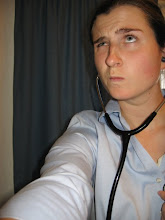Here is my schedule of classes:
_____________________________________________________________
HUBIO 512: Mechanisms in Cell Physiology (5 Credits)
Physiology of the cell membrane, including ionic and electrical potential gradients; active transport, excitability, and action potentials; biophysics of sensory receptors; neuromuscular transmission; muscle energetics and contractility; spinal reflexes and central synaptic transmission; autonomic nervous system; energy metabolism and temperature regulation; epithelial transport; gastrointestinal motility and secretions.
HUBIO 520: Molecular and Cellular Basis of Disease (6 Credits)
Patterns of cell and tissue response to injury. Mechanisms of cell injury, the inflammatory process, immunology, immunopathology, thrombosis, normal and abnormal growth, neoplasia, clinicopathological correlation.
HUBIO 522: Introduction to Clinical Medicine (4 Credits)
Medical history is introduced and instruction in data collection is begun. Experience in conducting medical interviews with patients to obtain the medical history and patient profile. Special problems related to interviewing are addressed.
HUBIO 523: Introduction to Immunology (2 Credits)
Basic concepts such as antigens; antibodies; complement; B- and T-lymphocyte function, including interactions with each other and with accessory cells; immunological tolerance; major histocompatibility complex; and role of these basic concepts in immunopathology (immunodeficiencies, hypersensitivities, autoimmunity, blood transfusion, and transplantation).
HUBIO 524: Biochemistry (4 Credits)
Classical molecular and cellular biochemistry, cellular physiology and molecular genetics. Metabolic interrelationships as they occur in the individual stressed and related to disturbances in disease states.
HUBIO 526: Systems of Human Behavior (2 Credits)
Effects of behavioral factors in major management problems faced in medical practice relating to cultural background, social role, sexual identity, and belief systems. Acquisition of skills in analyzing behavior, defining objectives, and designing precise treatment strategies.
An introduction to methods for identifying and retrieving Web-based high quality, relevant evidence, and to methods for describing and applying rigorous criteria when reading primary research studies or reviews of primary studies that report on the effectiveness of therapeutic or preventive interventions.
FAMED 501: Introduction to Family Medicine: Preceptorship (2.5 Credits)
Students spend one morning per week for one or more quarters working with a practicing community family physician.
_____________________________________________________________
If my calculations are correct, I am registered for 26.5 credits for winter quarter - fewer credits than we took in fall quarter, but apparently winter quarter is much shorter so the work load is worse than fall. Good times.




No comments:
Post a Comment